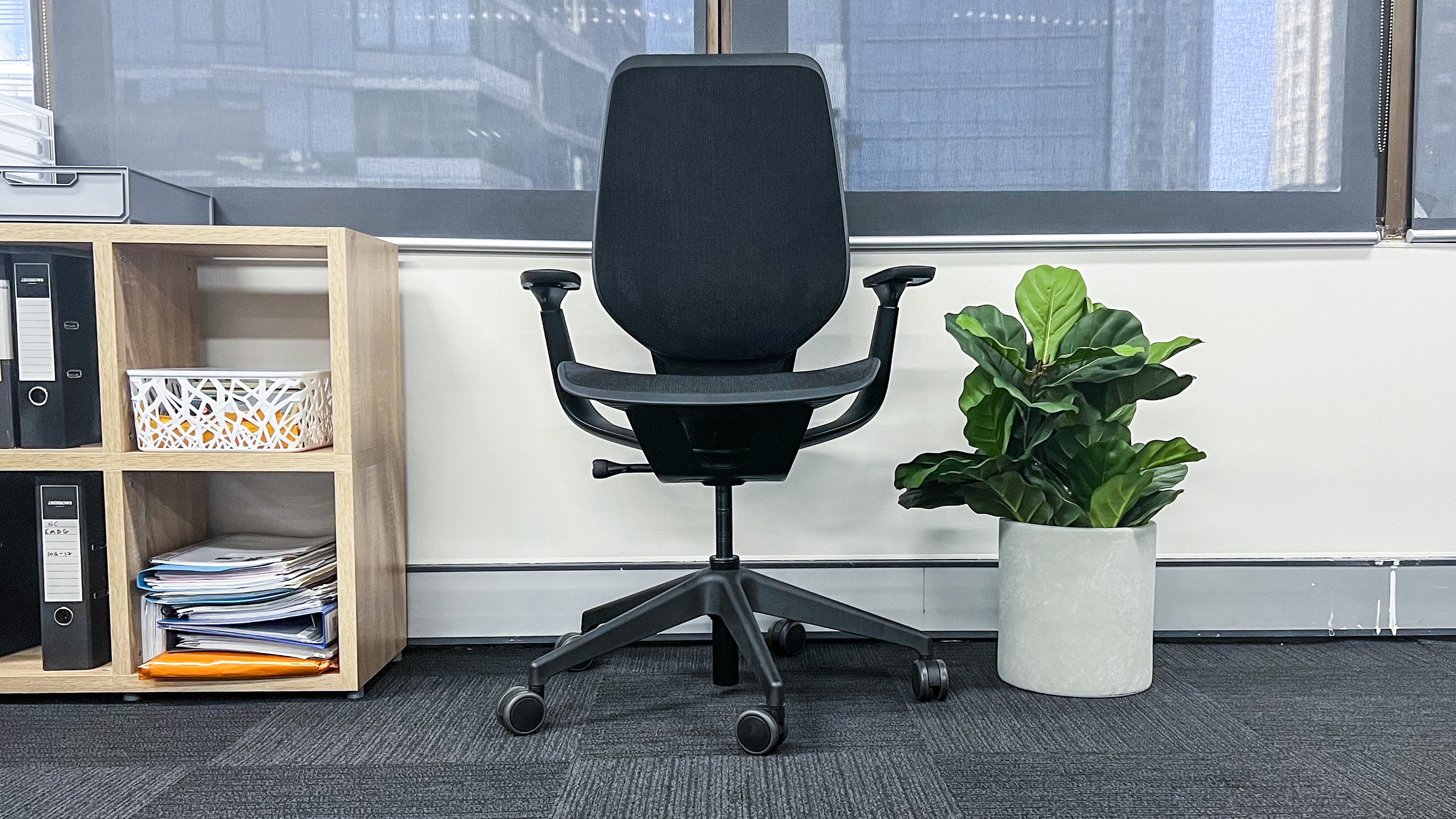
Steelcase Karman: One-minute review
I’d never seen an office chair that made me want to wolf whistle, but the Steelcase Karman sure did – particularly when I saw the black mesh-and-brass model. Sadly that’s not the chair I got for this review – I was sent the Black Opaque option – but I still can’t help admiring its sleek look.
To match the good looks is a uniquely agile design that should suit most users and would be good for a workplace where hot-desking is the norm. The Steelcase Karman is built around a weight-shifting mechanism that adjusts ever so slightly with body movements. Add to that a proprietary mesh material that’s designed to neither sag nor feel stiff, and it’s a chair that naturally flexes to support each user as they shift around throughout the day. That means each individual using the chair may not need to tinker with any adjustments other than height.
That’s a remarkable feat to achieve from a design standpoint, but it could also divide the users into two camps – you’ll either love it and hail it as one of the best office chairs you've ever sat upon, or it will severely disappoint. There are two reasons for that – the seat has a cushion under the mesh layer that can be too firm for some people, and the flexible backrest may not provide enough support for people who prefer lumbar support. I think that those who won’t like the Karman will however be in the minority, thanks to its flexibility. While the latter makes it worth considering for a hot-desking workspace, there are more ergonomic and affordable office chairs that you can get for home use.

Steecase Karman review: price and availability
- Announced in 2021
- Available since May 2023 in the US, Australia and Singapore
- Priced from $846 / AU$1,999 / SG$1,999 (UK price TBC)
Word of the Steelcase Karman was made public back in 2021 – at least in the US – with the company saying the chairs would be available some time in 2022. The final release took longer than expected however, with the Karman only arriving in May 2023 – but that's given Steelcase the time to make what is arguably a unique chair.
In the US, the Karman can be purchased directly from Steelcase with prices starting at $846 for the armless base model, going all the way up to $1,424 for the InterMix Shift material with all the bells and whistles. The US gets several colorways and different options to customise the Karman, but this isn’t the case for Australian buyers, as the chairs are currently only manufactured in the US and, to keep costs down, only a limited number of models are available Down Under.
If you’re buying in Australia, you can order it directly from Steelcase in four choices that differ just in the mesh material used. The two InterMix Opaque models will set you back a rather eye-watering AU$1,999 and the InterMix Shift option is an even more expensive AU$2,499. Coming in at the same premium price of AU$2,499 is the Black mesh/Bronze frame option as well. All four come with arms (which are optional in the US) and caster wheels.
Steelcase Australia says that shoppers Down Under are paying a premium on the price to cover the cost of having the chairs shipped and stored locally in warehouses, which does at least explain some of the gap. Still, it’s an expensive chair that I would recommend you try first before making a purchase – something that can be done at the Steelcase showrooms located in Sydney and Melbourne.
The Karman is currently not available in the UK, although it’s listed on the EU Steelcase website as “coming soon” and pricing is yet to be confirmed.
- Value score: 3.5/5

Steelcase Karman review: Design and setup
- Beautiful, streamlined design
- Flexible, lightweight frame
- Comes fully assembled
The Steelcase Karman comes to you fully assembled in both the US and Australia (I presume that will be the case in the UK as well when it finally launches there). And you’ll notice why that's important as soon as you lay eyes on it. It’s not quite the traditional mesh office chair design. The frame is curvy, lightweight and is molded in such a way that it looks like it’s all one single piece.
The frame is also flexible – it won’t bend out of shape, but will shift a little with a user’s movements through the day. For example, the seat will dip marginally when body weight settles on it, then shift a little if you happen to lean or twist towards one side at any point during the day. The backrest will also move if you lean back, and you can lock it in place with a twist of a knob called the Comfort Dial.
Speaking of which, the Comfort Dial and its adjoining lever under the seat – which changes the seat height – are the only adjustments you can make for the frame. The other adjustable parts of the chair are the armrests (if you opt in for them, for those in the US).
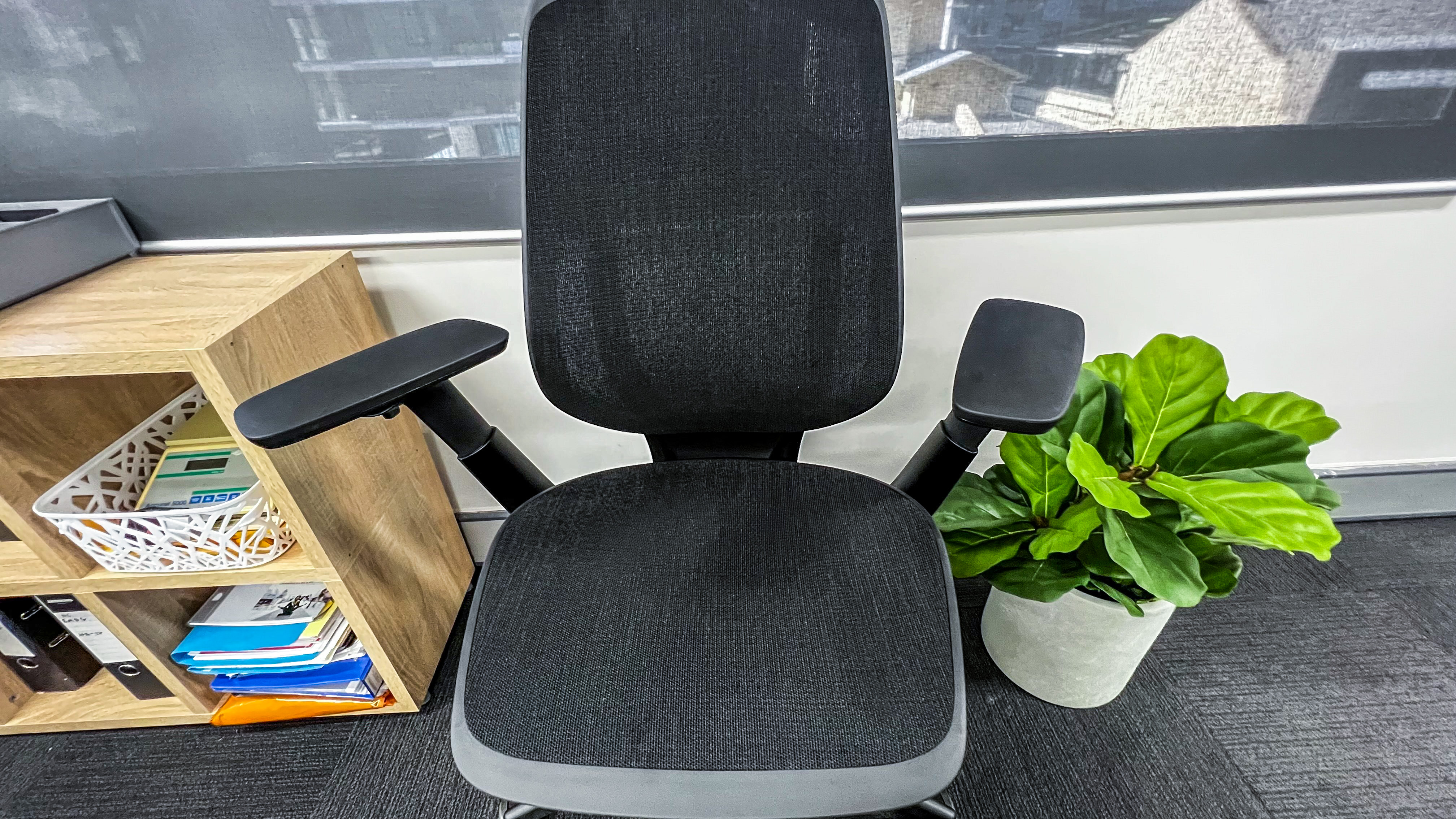
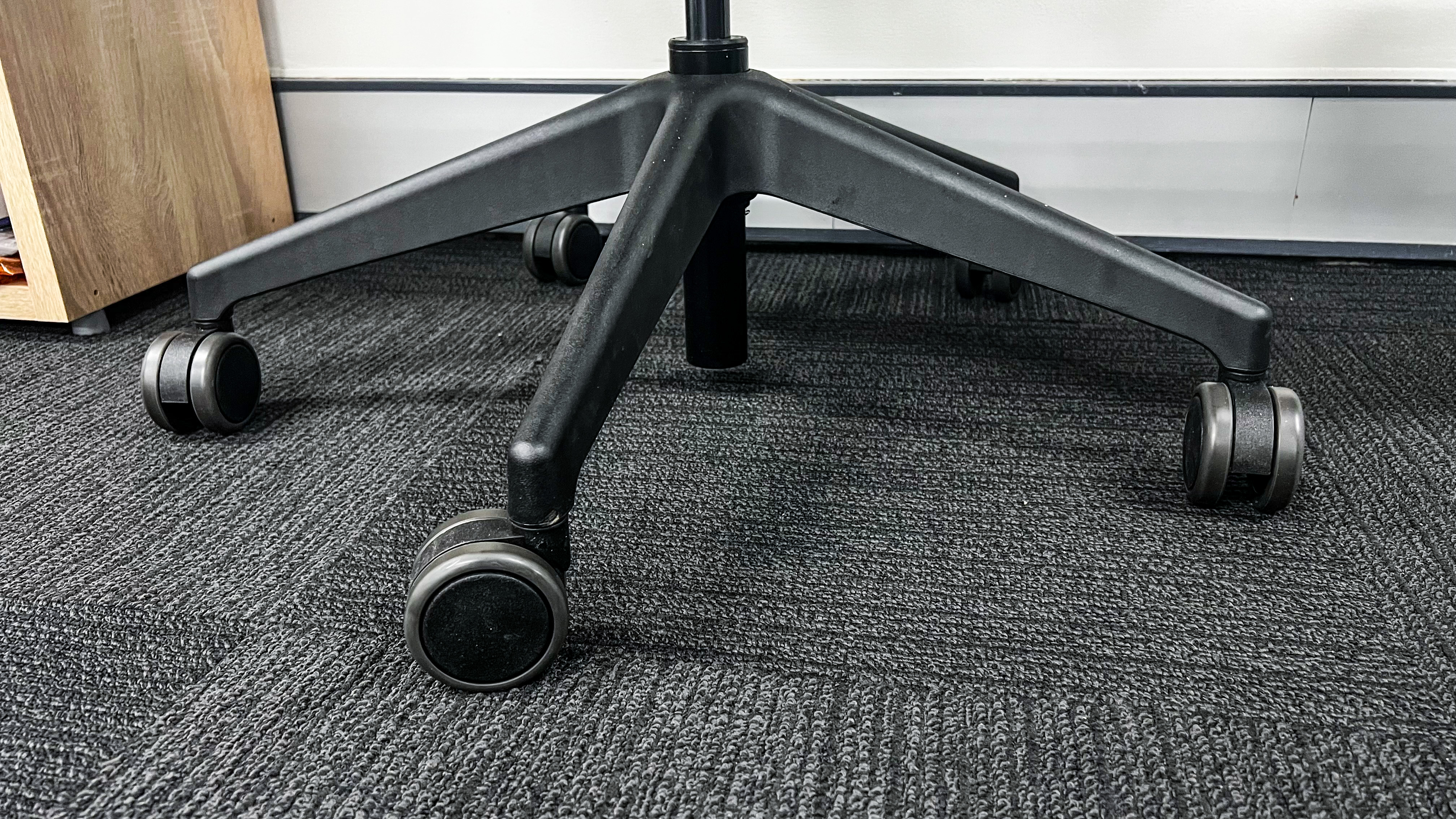
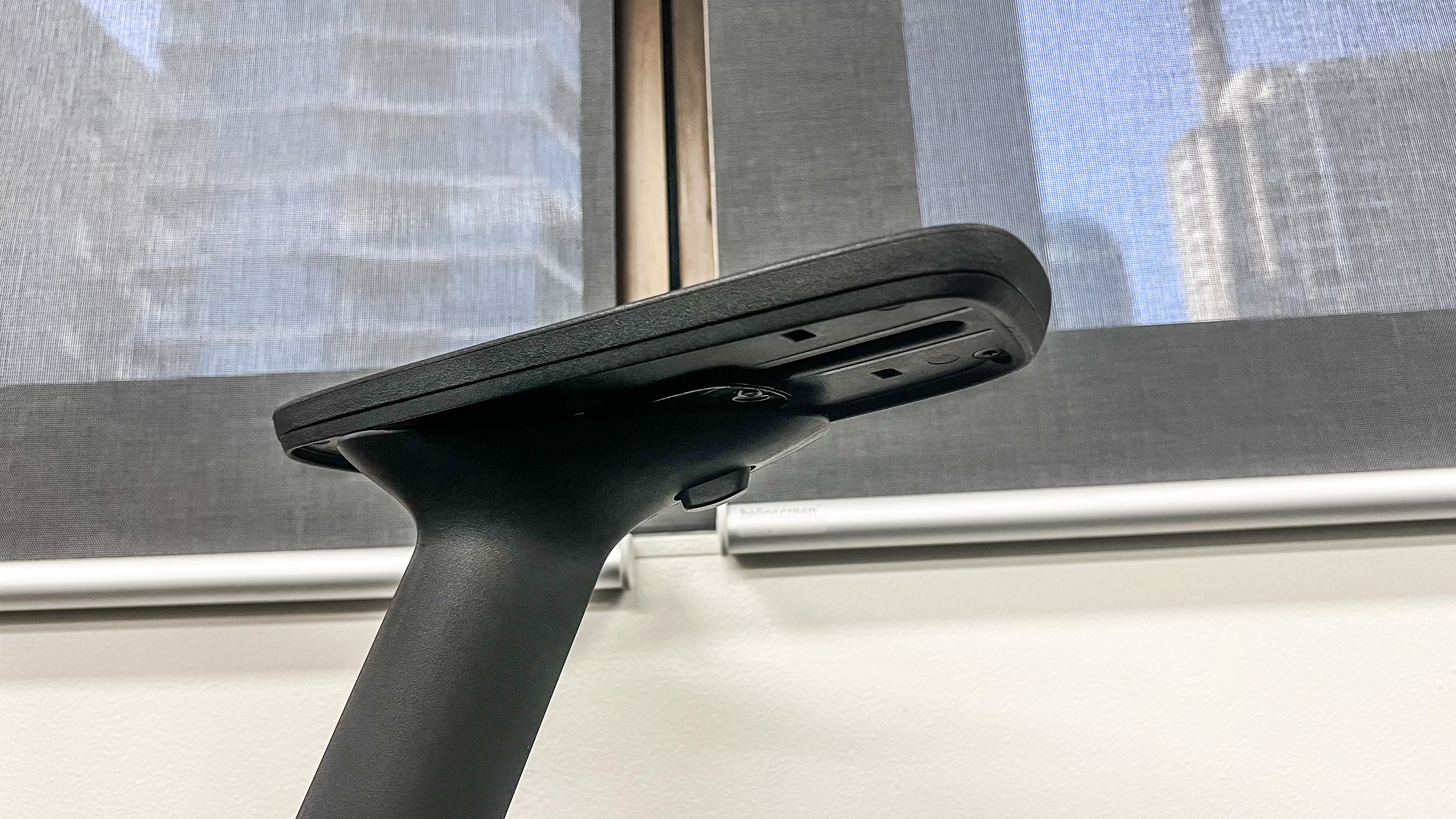
The arms can be raised/lowered, and the pads swivel a little, plus slide back and forth. That might be sufficient for most users, but I found it a little lacking as I’ve come to the Karman after trying the Steelcase Gesture. The armrests on the latter have extensive adjustments that can boggle the mind and I am a huge fan. At the Karman’s price point (particularly for the more premium models), I think I’d have preferred the Gesture-type pivoting armrests.
The mesh used in the Karman is also in keeping with the nature of the chair – it’s a patented material that’s neither too stiff nor too soft, and Steelcase claims it won't sag over time. Steelcase calls this Intermix Technology and a “textile”, which is apt, as the mesh looks and feels like fabric, not plastic. It’s comfortable and breathable. Interestingly, the seat has an integrated cushion that adds some firmness and that was divisive in TechRadar’s Sydney office – I loved it, as did one other colleague, but two other colleagues thought the seat was too hard, and undermined the natural breathability of the mesh design.
The Intermix Opaque material is a solid colour mesh, while the Intermix Shift is similar to shot silk (woven using two or more colours) where slight movements will make the material change colour. I’ve seen the Intermix Shift (red/blue) and, personally, I didn’t find the colour too appealing. It looked purple and the colour shifting was barely noticeable – depending on where you place it, it could look dull. Like I said, that’s just me though, and it’s possible you might actually like it – the colour is quite different from anything you’d find on an office chair.
- Design score: 4.5/5
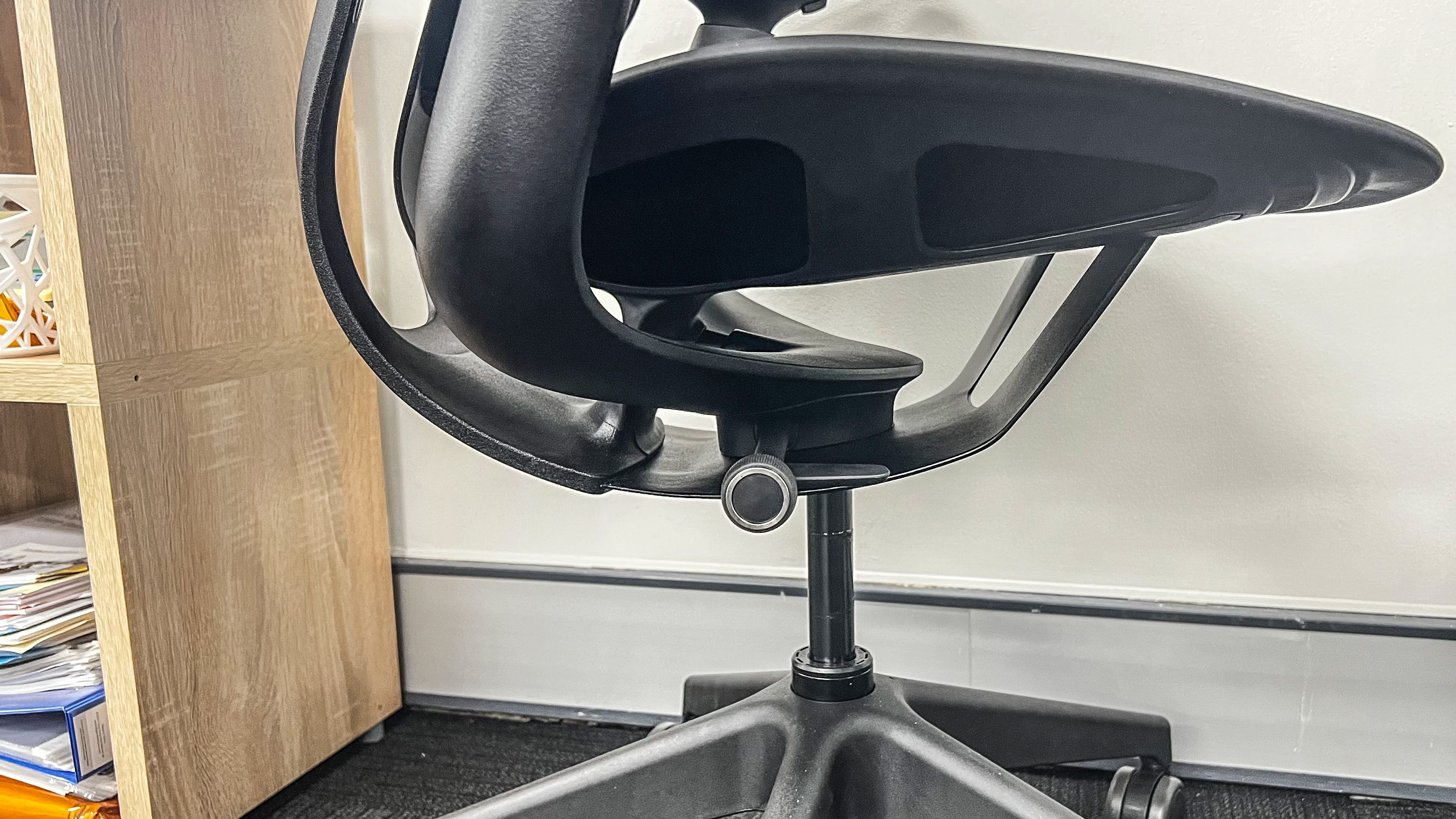
Steelcase Karman review: Comfort
- Comfortable for most users
- Breathable in warm climes
- Lacks lumbar support by default
I’ve been testing office chairs for a while now and I will admit that the Steelcase Karman is arguably the most unique chair I’ve sat on. It’s hands-down the most flexible chair I’ve had the pleasure of trying, but the jury is out on whether it’s the most comfortable.
Using it for a day or two is fine, but I find that its lack of lumbar support – which is an optional extra that isn't available in Australia, where this review was conducted – isn't right for me. That means, I wouldn’t consider it for my home office setup. For the workplace, however, it’s actually got a lot more appeal, particularly in a hotdesking environment like the TechRadar office – not having to adjust your chair first thing in the morning is something most of us were sold on.
Personally, I love the integrated-cushion seat. It’s firm without being too hard and I prefer it to the ErgoTune Supreme V3’s all-mesh seat. But as I’ve already mentioned, not everyone seems to like the cushion, as some users found it too hard to sit on all day.
The recline angle has also been a point of contention amongst us colleagues. Despite the backrest automatically adjusting to each person, we found that it was best to leave the Comfort Dial in its unlocked position to suit each user. Locking it in place makes the backrest shift only every so marginally as to make no difference whatsoever. Thankfully there is just enough resistance when unlocked to prevent you from tipping backwards suddenly, although I’d have preferred just a touch more resistance myself.

The armrests, too, may not be for everyone. With limited adjustments as compared to the Steelcase Gesture, they feel more like an afterthought in the whole design. For example, the armrest pads don’t move forward as much as the ones on the Gesture do, and they don’t pivot as much either. So not everyone who tried the Karman in TechRadar’s Sydney office liked the armrests. It’s a pity that they’re not optional for Australian shoppers, as they are for those in the US.
While you likely won’t miss the lack of lumbar support on the Karman if you’re using it a day or two a week in the workplace if you hot desk, it may make its presence felt if you have lower-back issues and need a more ergonomic setup. The shifting backrest mesh does provide some lower-back support, but not enough to suit those who like a decisive lumbar bump.
And if your office or home setup isn’t air-conditioned in summer, the Karman will help keep you cool. The proprietary mesh is not just breathable, it also seems to absorb some moisture – it isn’t moisture-wicking, however. That makes it an ideal choice for hot, humid climates.
Flawed as it might be, I have to reiterate that this chair was made for a specific workplace scenario and, for that purpose, it’s a good option.
- Comfort score: 4/5








